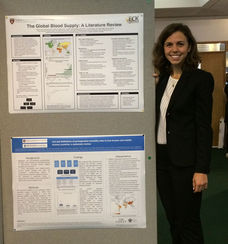
Katie Kralievits, ’13, MS ’14, attended the international launch of the Lancet Commission on Global Surgery (LCoGS) at the Royal Society of Medicine in London, UK, on April 27 and 28, 2015. The Commission was written by a group of 25 global leading experts from across the fields of surgery and anesthesia, with contributions from more than 110 countries. The report examines the case for surgery and anesthesia care as an integral component of health care, focusing on low- and middle-income countries (LMICs), where need is greatest. The Commission produced five key messages as well as provided a set of indicators for monitoring and evaluation, recommendations to improve access to safe and affordable surgery and anesthesia, and a policy template for national surgical plans.
In July of 2014, Kralievits began an on-going internship with the Program of Global Surgery and Social Change (PGSSC) at Harvard Medical School, led by Dr. John G. Meara ’86, MD, co-chair of the Commission. During her time with the PGSSC, Kralievits supported research for the Commission report, focusing on the state of the global blood supply and its impact on surgical care delivery in low resource settings. From her research findings, she submitted an abstract entitled, “The Global Blood Supply: A Literature Review,” that was accepted for publication in The Lancet alongside the Commission report. Additionally, she co-authored a comment entitled, “The blood drought in context,” that was accepted for publication in The Lancet Global Health. She was able to present her abstract at both the London Launch and Boston Launch on May 6, 2015. Kralievits is currently working for Partners In Health as a Research Assistant to Dr. Paul Farmer and continues to work with Dr. Meara and the PGSSC.
Kralievits met Meara during one of his trips to Notre Dame as part of Notre Dame’s Master of Science in Global Health Career Lunch series run by the Eck Institute for Global Health. While she was still a student she made the connection and launched her interest in contributing and supporting the research of the Commission. Kralievits states, “The Eck Institute for Global Health not only provides its students with a comprehensive foundation for a future in global health, but also creates so many amazing opportunities for us to interact with and learn from leaders in the field. The work of Dr. Meara and the Lancet Commission is such an important contribution to global health and I am so grateful to have been a part of it.”
Director of Global Health Training, Dr. Katherine Taylor notes, “We are proud of alumni like Katie who have taken their experience and education at Notre Dame and are on the fast track to implementing change for the greater good through improvements toward health as a fundamental human right.”
The Master of Science in Global Health program is a 12-month graduate program. Two semesters are spent on campus with course work that prepares the student for a six- to eight-week field research experience. Students serve abroad in a resource-poor location and upon returning from their experience, each student submits and presents a capstone project. This scholarly work includes original or literature-based research by which they connect classroom science-centric training, survey research, and mathematical modeling to the field via hands-on experience.
The Eck Institute for Global Health recognizes health as a fundamental human right and endeavors to promote research, training, and service to advance health standards for all people, especially people in low-and middle-income countries, who are disproportionately impacted by preventable diseases.
Contact: Sarah Craig at Craig.20@nd.edu or call 574-631-2665